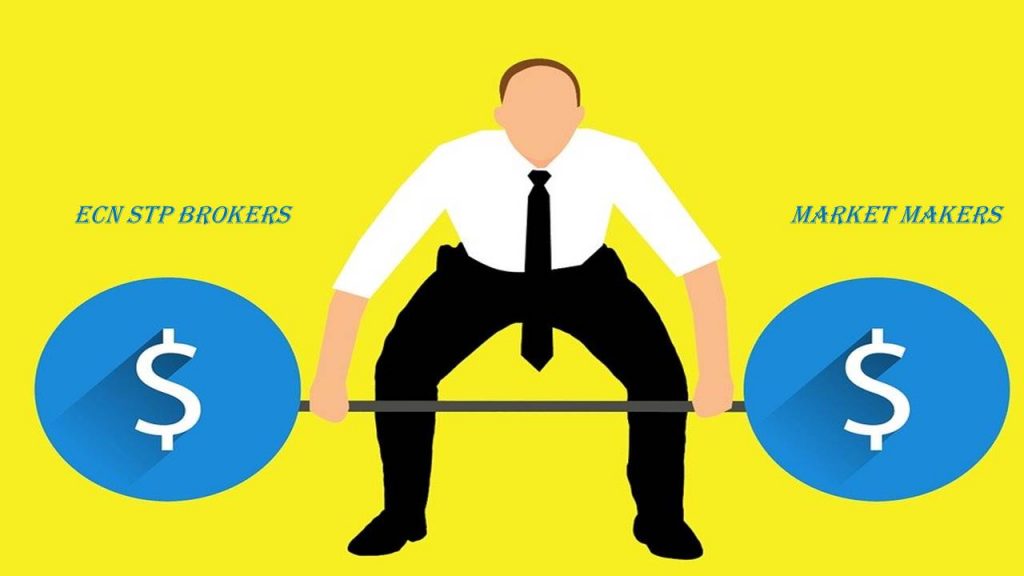To control the risk associated with the positions of forex traders, brokers can choose between two methods. A No Dealing Desk broker redirects trading orders to a market maker who acts as a counterpart while the Dealing Desk broker controls the risk within his company using market-making specialists.
Forex brokers frequently use the term No Dealing Desk as a marketing argument, claiming that Dealing Desk brokers are making money on losses from their clients. So, is the forex trader interested in opening a Dealing Desk account? This article will show you that there are not any differences between Market Makers & ECN Brokers, because in both cases, your orders end up at a market maker.

The main argument of NDD brokers is that they have more interest in seeing their clients make money because unlike forex Markets Maker brokers, they do not take positions against their clients. At first glance, it is, therefore, more reassuring to open an NDD trading account, but in reality, the figures published by the NFA in the United States show that clients of NDD brokers also lose their money often see more in some cases.
The rumor often spread on the internet is false; DD brokers just like NDD, do not try to make money on the losses of their customers. They are legitimately looking to make as much money as possible from the trades they win or lose. More and more forex brokers are offering their clients access to trading on the interbank market. It brings together a large number of financial markets and participants in the forex market.
Table of Contents
Dealing Desk Brokers (Markets Maker or Market Maker)
Dealing Desk brokers (Markets Maker or market maker) do not redirect all orders to external counter parties; they can also compare their clients’ orders with each other to pocket the entire spread. For example, if a customer buys at a certain price sold by another customer, the order will not go through the interbank market. The dealing desk of the broker market maker can also decide to cover the positions of its clients on the interbank market by obtaining a better price compared to the client’s request, in this case, the broker pockets the spread plus the difference between the price asked by the customer and the price actually obtained on the market.
STP and ECN No Dealing Desk Forex Brokers
No dealing desk brokers can be classified into two categories: STP or ECN + STP. In theory, a No Dealing Desk broker acts only as an intermediary for trnzansactions that he redirects to market makers, for a commission. But in practice, it also does market making because it compares the prices of its different liquidity providers to obtain a minimum spread which can sometimes be 0 pip. However, zero spreads are never offered to clients of no dealing desk brokers. In this case, the NDD broker, therefore, pockets an additional commission like a market maker.
What is an STP Broker?
STP brokers generally have many liquidity providers which allow them to filter out the best prices available. This type of broker is remunerated by slightly increasing the spread.
What is an ECN Broker?
An ECN broker allows its customers to interact with the orders of other participants within the ECN (Electronic Communication Networks) network. These foreign exchange market participants trade currencies against each other by offering their best bid and ask prices.
ECN brokers also allow their clients to see the depth of the market (the order book). Thus, traders can see the orders of other participants. ECN brokers do not increase the spread, and they are paid with a commission according to the volume of transactions.
The most advanced and conflict free-market model in the Forex market. The broker is only an intermediary in the trade, who charges a commission for each transaction. It concentrates the so-called liquidity providers with which it associates the orders of its clients. The market is not simulated; the prices generally come from the most significant world banks (Deutsche Bank, Goldman Sachs, UBS, JP Morgan and others). The customer always receives the most favorable price possible, chosen from other competitors, available at the same time. Due to a large number of scroll commands, you may get the impression that prices on ECN platforms change faster and are more precise.
Since the ECN broker is only an intermediary, there is no question of a conflict of interest between him and the client. There is no manipulation of the price or other intentional licks that could make life difficult for the investor. However, not all gold shines – ECN also has its drawbacks.
Because the broker is not a party to the transaction and acts as an intermediary, he transfers orders further and must find a second investor who will conclude a transaction opposite to ours. With a dynamic change in prices (for example, after the publication of macro data) or limited market liquidity (night hours, holidays), so-called price shifts, i.e., the execution of orders at prices other than those indicated by the investor. This results from the problem of associating orders with each other in such sensitive situations, over which the broker does not have much influence — the whole phenomenon results from the specifics of the functioning of market mechanisms.

